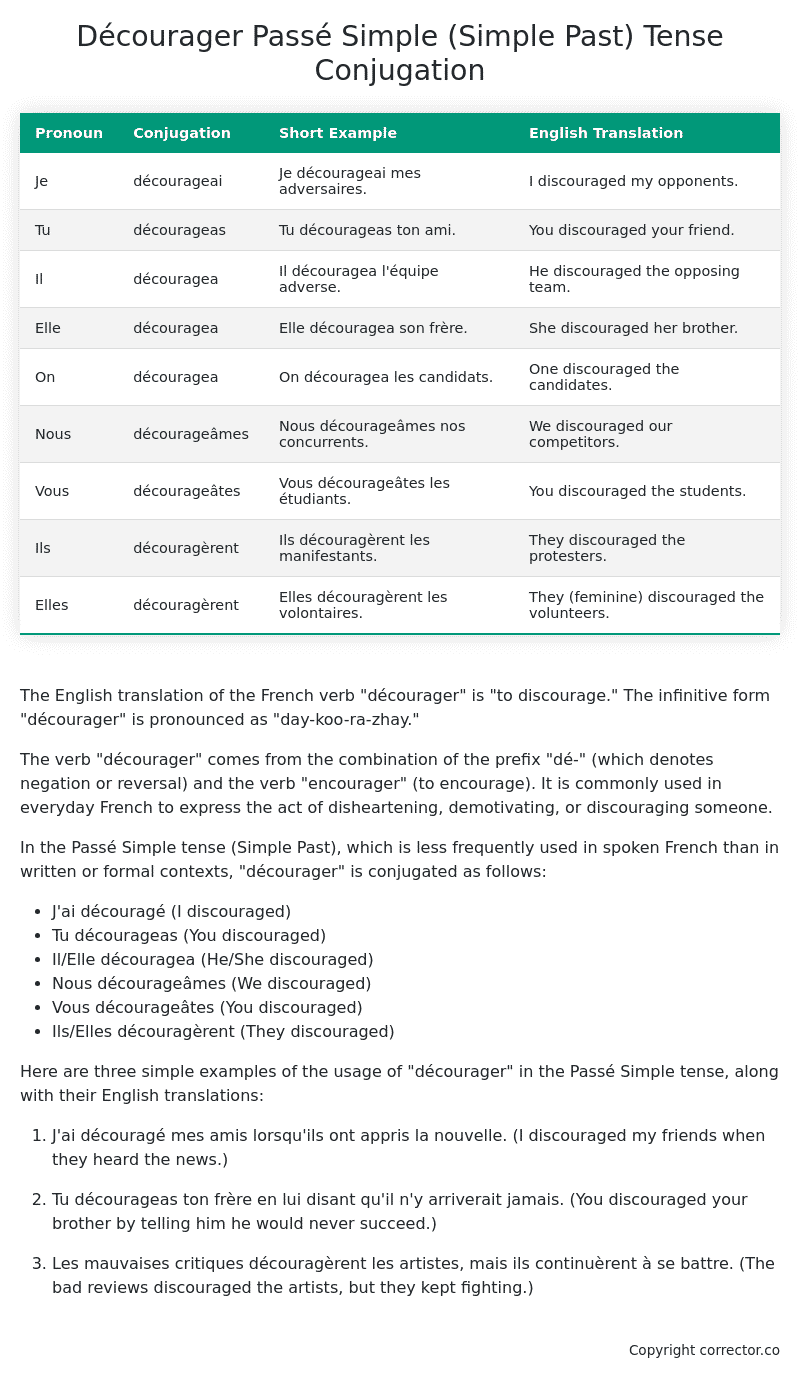Passé Simple (Simple Past) Tense Conjugation of the French Verb décourager
Introduction to the verb décourager
The English translation of the French verb “décourager” is “to discourage.” The infinitive form “décourager” is pronounced as “day-koo-ra-zhay.”
The verb “décourager” comes from the combination of the prefix “dé-” (which denotes negation or reversal) and the verb “encourager” (to encourage). It is commonly used in everyday French to express the act of disheartening, demotivating, or discouraging someone.
In the Passé Simple tense (Simple Past), which is less frequently used in spoken French than in written or formal contexts, “décourager” is conjugated as follows:
- J’ai découragé (I discouraged)
- Tu décourageas (You discouraged)
- Il/Elle découragea (He/She discouraged)
- Nous décourageâmes (We discouraged)
- Vous décourageâtes (You discouraged)
- Ils/Elles découragèrent (They discouraged)
Here are three simple examples of the usage of “décourager” in the Passé Simple tense, along with their English translations:
-
J’ai découragé mes amis lorsqu’ils ont appris la nouvelle.
(I discouraged my friends when they heard the news.) -
Tu décourageas ton frère en lui disant qu’il n’y arriverait jamais.
(You discouraged your brother by telling him he would never succeed.) -
Les mauvaises critiques découragèrent les artistes, mais ils continuèrent à se battre.
(The bad reviews discouraged the artists, but they kept fighting.)
Table of the Passé Simple (Simple Past) Tense Conjugation of décourager
| Pronoun | Conjugation | Short Example | English Translation |
|---|---|---|---|
| Je | décourageai | Je décourageai mes adversaires. | I discouraged my opponents. |
| Tu | décourageas | Tu décourageas ton ami. | You discouraged your friend. |
| Il | découragea | Il découragea l’équipe adverse. | He discouraged the opposing team. |
| Elle | découragea | Elle découragea son frère. | She discouraged her brother. |
| On | découragea | On découragea les candidats. | One discouraged the candidates. |
| Nous | décourageâmes | Nous décourageâmes nos concurrents. | We discouraged our competitors. |
| Vous | décourageâtes | Vous décourageâtes les étudiants. | You discouraged the students. |
| Ils | découragèrent | Ils découragèrent les manifestants. | They discouraged the protesters. |
| Elles | découragèrent | Elles découragèrent les volontaires. | They (feminine) discouraged the volunteers. |
Other Conjugations for Décourager.
Le Present (Present Tense) Conjugation of the French Verb décourager
Imparfait (Imperfect) Tense Conjugation of the French Verb décourager
Passé Simple (Simple Past) Tense Conjugation of the French Verb décourager (You’re reading it right now!)
Passé Composé (Present Perfect) Tense Conjugation of the French Verb décourager
Futur Simple (Simple Future) Tense Conjugation of the French Verb décourager
Futur Proche (Near Future) Tense Conjugation of the French Verb décourager
Plus-que-parfait (Pluperfect) Tense Conjugation of the French Verb décourager
Passé Antérieur (Past Anterior) Tense Conjugation of the French Verb décourager
Futur Antérieur (Future Anterior) Tense Conjugation of the French Verb décourager
Subjonctif Présent (Subjunctive Present) Tense Conjugation of the French Verb décourager
Subjonctif Passé (Subjunctive Past) Tense Conjugation of the French Verb décourager
Subjonctif Imparfait (Subjunctive Imperfect) Tense Conjugation of the French Verb décourager
Subjonctif Plus-que-parfait (Subjunctive Pluperfect) Tense Conjugation of the French Verb décourager
Conditionnel Présent (Conditional Present) Tense Conjugation of the French Verb décourager
Conditionnel Passé (Conditional Past) Tense Conjugation of the French Verb décourager
Conditionnel Passé II (Conditional Past II) Tense Conjugation of the French Verb décourager
L’impératif Présent (Imperative Present) Tense Conjugation of the French Verb décourager
L’impératif Passé (Imperative Past) Tense Conjugation of the French Verb décourager
L’infinitif Présent (Infinitive Present) Tense Conjugation of the French Verb décourager
L’infinitif Passé (Infinitive Past) Tense Conjugation of the French Verb décourager
Le Participe Présent (Present Participle) Tense Conjugation of the French Verb décourager
Le Participe Passé (Past Participle) Tense Conjugation of the French Verb décourager
Struggling with French verbs or the language in general? Why not use our free French Grammar Checker – no registration required!
Get a FREE Download Study Sheet of this Conjugation 🔥
Simply right click the image below, click “save image” and get your free reference for the décourager Passé Simple tense conjugation!

Décourager – About the French Passé Simple (Simple Past) Tense
Formation
Usage
Narration
Historical Context
Interactions with other tenses
Passé Composé
Imparfait
Conditional and Subjunctive
Summary
I hope you enjoyed this article on the verb décourager. Still in a learning mood? Check out another TOTALLY random French verb conjugation!


